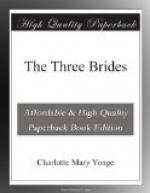The turmoil was over, the gains had been emptied into bags to be counted at leisure, the relics of the sale left to be disposed of through the Exchange and Mart. Terry, looking tired to death, descended from his post as assistant showman; and, with some gentlemen who were to dine at Compton Poynsett, Cecil drove home to dress in haste, and act hostess to a large dinner-party. All the time she felt giddy at the words she had heard—“Mr. Poynsett’s old flame.” It was constantly ringing in her ears, and one conviction was before her mind. Her cheeks burnt like fire, and when she reached her own room at night, and leant from the window to cool them, they only burnt the more.
Had she been wilfully deceived? had she been taking the counsel of a jealous woman about her husband? Had not Camilla assured her that the object of his first love was not in the country? Ay; but when that was spoken Camilla herself was in London, and Cecil knew enough of her friend to be aware that she viewed such a subterfuge as ingenious. Even then she had perceived that the person alluded to could only have been a Vivian, and the exclamation of careless spite carried assurance to her that she had been tricked into confidence, and acceptance of the advice of a rival. She had a feverish longing to know more, and obtain explanation and external certainty. But how?
Raymond was one of the very tired that night. He fell asleep the instant his head touched the pillow; but it was that sobbing, sighing sleep which had before almost swept away, from very ruth, her resolution; and on this night there were faltering words, strangely, though unconsciously, replying to her thoughts. “Camilla, a cruel revenge!” “Poor child! but for you she might have learnt.” “My mother!” “Why, why this persistent hatred?” “Cannot you let us alone?” “Must you destroy our home?”
These were the mutterings at intervals. She listened, and in the darkness her impulse was to throw herself on her husband, tell him all, show him how she had been misled, and promise to give up all to which that true Vivienne had prompted her. She did even try to wake him, but the attempt caused only a more distinct expostulation of “Cannot you let her alone?” “Cannot you let us learn to love one another?” “It may be revenge on me or my mother; but what has she done?” “Don’t!—oh, don’t!”
The distress she caused forced her to desist, and she remembered how Raymond had always warned her. The intimacy with Lady Tyrrell had been in the teeth of his remonstrances. He had said everything to prevent it short of confessing his former attachment, and though resentful that the warning had been denied her, she felt it had been well that she had been prevented from putting the question on her first impulse. Many ways of ascertaining the fact were revolved by her as with an aching head she lay hopelessly awake till morning, when she fell into a doze which lasted




